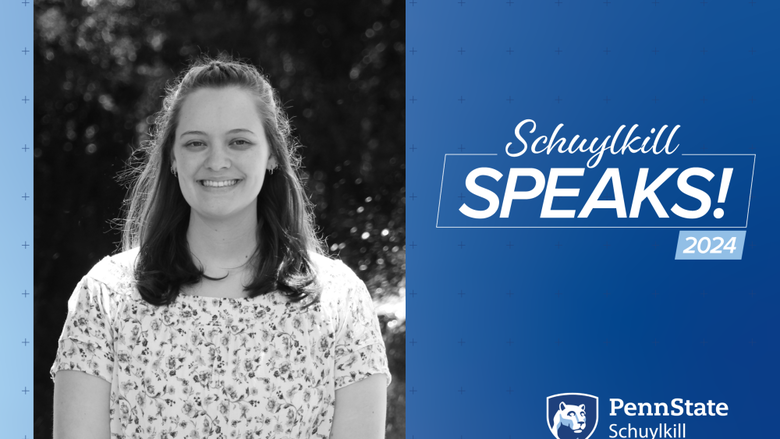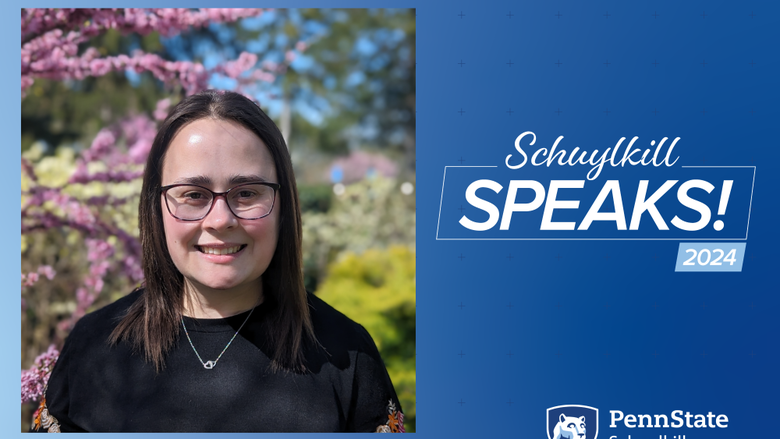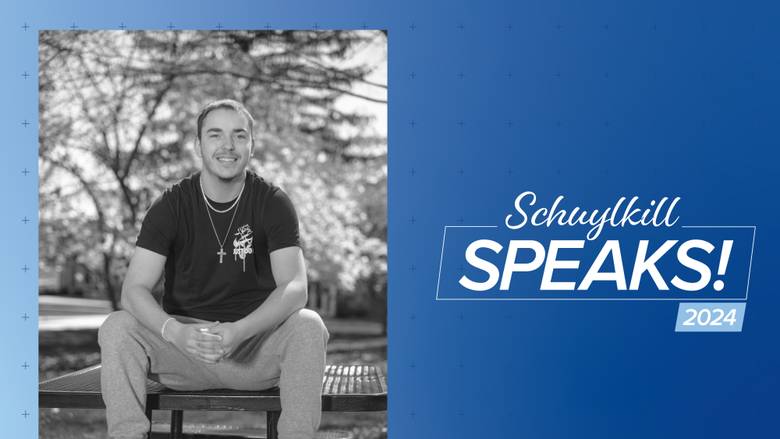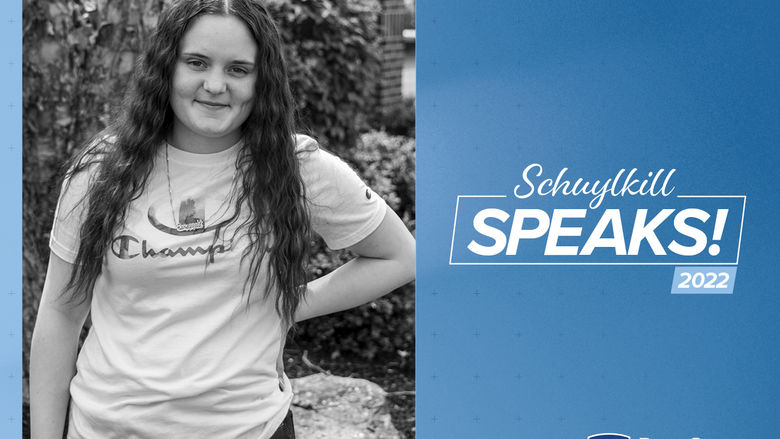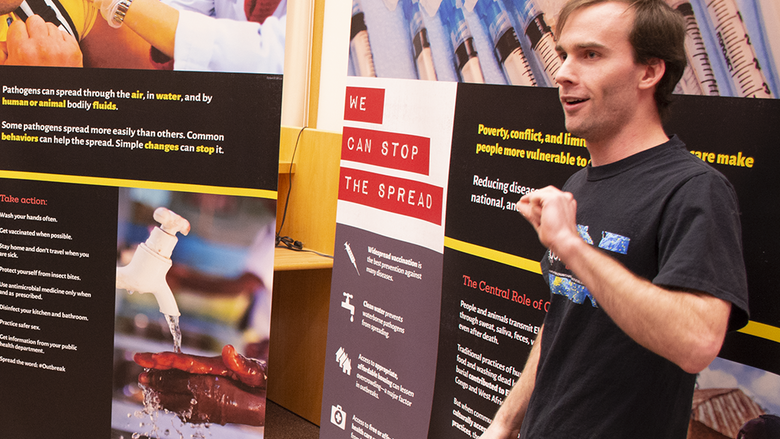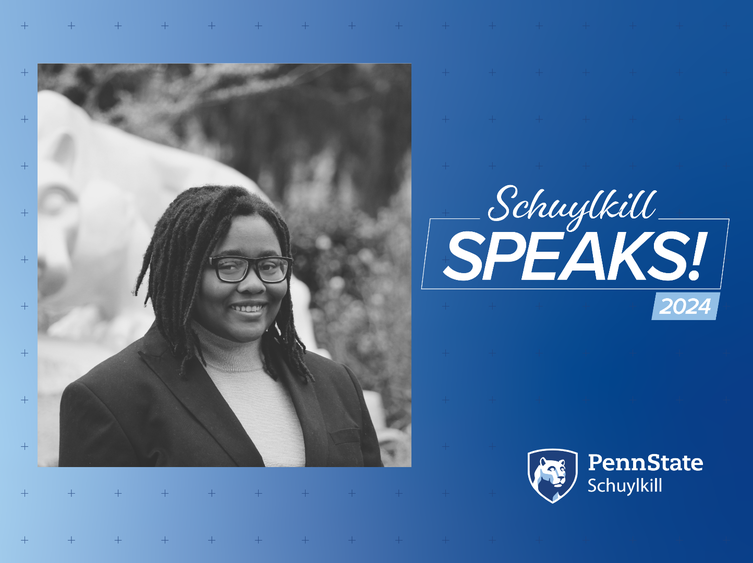
Poetic Session
Editor's note: This story is part of a series profiling exceptional members of Penn State Schuylkill’s graduating class. For more stories like Session's, visit schuylkill.psu.edu/schuylkill-speaks.
SCHUYLKILL HAVEN, PA — Psychology student Poetic Session's journey at Penn State Schuylkill has been marked by a deep commitment to mental health advocacy and making meaningful connections within the campus community. Session is a passionate advocate for mental health awareness, driven by a profound desire to dismantle the stigma surrounding mental health services, particularly within the Black and Hispanic communities.
Growing up in a multicultural household, Session said that she observed the barriers individuals faced in accessing resources and support. Motivated by a personal mission to pave the way for others, she pursued a degree in psychology. At Penn State Schuylkill, Session said she not only found a nurturing environment but also the resources and support necessary to thrive academically and personally.
During her time at Penn State Schuylkill, Session found a proclivity for undergraduate research, which was propelled by influential professors. Notably, her undertaking was inspired by the encouragement of Valerie Schrader, professor of communication arts and sciences. With Schrader’s mentorship, Session was able to solidify her decision to continue research post-graduation. Schrader’s dedication to providing opportunities for hands-on research experiences and facilitating connections within the field of psychology left an indelible mark on Session’s academic and professional trajectory, Session said.
One of Session’s most cherished memories of research, she said, is from a recent project exploring the complex dynamics between Israel and Palestine titled “The Rights of the ‘Uncivilized’: Applying Social Constructionism and Agenda-Setting to Dehumanization Rhetoric in the current Israeli-Palestinian Conflict.”
“It is my favorite because I’ve learned a lot about myself, others, and about many social issues as a whole, and was able to present the research and have meaningful and deep conversations that many people are afraid to have," said Session. "I think it is a project that I will certainly carry with me, and it has deeply affected how I view the world around me.”
Session has been a leader in on-campus activities and programs. She was involved with the Blue & White Society as a treasurer, and she served as a tutor for the co-op program.
“Poetic has been a joy to work with over the last four years,” said Kate Zimmerman, director of cooperative and continuing education. “She joined Penn State Schuylkill Co-Op when it launched in Fall 2020 and has been an active member, participating in internships with Gym-Jam Therapeutics Inc. and Rosewood Rehabilitation and Nursing Center. Not only has Poetic worked on her own career and professional development, but she served her peers as the embedded tutor for the co-op courses for six semesters. Her guidance and one-on-one support has helped many students take their first step into career development. I am so thankful for her time, help, feedback, and support. I know she has a bright future ahead of her.”
Reflecting on her time at Penn State Schuylkill, Session said that she expresses gratitude for the connections and experiences she has had on campus. She appreciates the supportive community in the library and the opportunities she had with her roles in the Admissions and Financial Aid offices, which provided her with a sense of family. Looking ahead, Session wants to further explore research in autism and psychosis.
“Poetic is a model student at Penn State Schuylkill,” said Cory Scherer, interim director of academic affairs and associate professor of psychology. “I had the pleasure of having her from her first semester on and she was fantastic in the classroom and a terrific researcher. She also was a terrific ambassador for the campus.”
Q: Why did you choose Penn State Schuylkill?
Session: "I chose Penn State Schuylkill because I wanted a welcoming, homey environment and a place where I felt connected to the people. It was also cost-effective, and I appreciated the apartment-style living. You have independence, yet still have the resources of a supportive campus. The opportunities are similar to those at larger campuses but more accessible because we are smaller."
Q: With your involvement in the psychology program, is there a class or instructor that had the most impact and why?
Session: "Cory Scherer helped me understand the process of pursuing graduate school and going further in my academic career. Since the start of my college journey, I've always wanted to become a doctor, and Dr. Scherer helped clarify the path. Jessica Saalfield, assistant professor of psychology, expanded my understanding of empathy and helped me better understand people. Her support has fueled my own drive, as I've learned how common these experiences are and the importance of providing help to those who need it. Valerie Schrader allowed me to complete as much research as I could and assisted with applying to conferences and funding."
Q: As a Penn State Schuylkill graduate, what advice would you give to an incoming student?
Session: "Be active on campus. Don't hesitate to talk to professors or engage with other people. In college, you can connect with people openly and have conversations. Be authentic and start building relationships early on. Spend time in the library and immerse yourself in the campus. It's not just a school environment; it's a college experience."
